“Philosophy is the top of a cereal box. Religion is a smile on a dog. I’m not aware of too many things; I know what I know, if you know what I mean…” – Edie Brickell
Ever since I began my career as a teacher, I’ve used the above quote to begin a discussion about my philosophy of literacy education, leadership, and academic study. I have a strong desire to work in multicultural settings where the promotion of every individual counts. I experienced success in an urban classroom, even though not much is known about meeting the multiple literacy needs of diverse students who attend such schools (Ball, 2006; Fecho, 2000; Rogers, Morrell & Enyedy, 2007).
I believe in experience and reflection to equal knowledge and live by John Dewey’s motto. Because of this, I’m using my ten years of classroom teaching to a diverse group of students as a foundation for my current research. My work as a classroom teacher at the J. Graham Brown School in Louisville, Kentucky, was a solid model of fully inclusive education and for holding high standards to all students; my teaching experiences from this one school are also important to me. The relationships I was able to build with over 600 students and the friendships I made with hard working colleagues will remain with me for life.
Before arriving to Syracuse University, I didn’t know that dis/ability studies existed nor that there was a theoretical framework for questioning how normalcy is defined in schools (e.g., Danforth & Gabel, 2006). The Brown School, where I worked, was a setting where all abilities were promoted no matter what those abilities were and my discovery that this was not the norm in other schools became apparent when I left the classroom. I didn’t have a name for the work we did at the Brown School until meeting Dr. Beth Ferri at Syracuse University and she introduced me to the Dis/abilities discourses (e.g., Ferri & Connor, 2006; Kliewer, 2006; Kunc; 2006; Taylor; 2006). The visionaries who built my k – 12 public school in 1972, the year I was born, were brilliant and considered to model their school as an environment for all students. They designed the school with a unique mission that adhered to a set of shared values to promote diversity, to give back to the community, to promote individuality, to maintain a relaxed learning environment, and to establish a strong academic promotion for all students. The Brown School was a “Community of Practice” (Englert, Mariage & Dunsmore; 2006; Morrell & Enyedy, 2007 ).
To understand my thinking about teaching and leadership, one must know I do not think in textual terms alone (even if I am an English teacher and writer). Instead, I like to work with art (e.g., Cahnmann, 2003; Cahnmann Taylor & Siegesmund; 2008), spoken language (e.g., Fisher, 2007), film (e.g., Watkins, 2006) and theatrics. Text, I believe, limits what a human mind can do, and I imagine if teachers and administrators promote it alone, they will short-change their clientele. This is why, for the purpose of an educational philosophy, I opted to include seven pieces from Richard Stine’s text Face to Face with the Second Step (1994) to help me make sense of how I think about my scholarship. I agree with Eliot Eisner (2008) when he writes, “I don’t think there is one destination that several roads will lead you to, but there are, rather, multiple destinations which require multiple roads” (22).
Madman attempting to empty the ocean with a spoon.
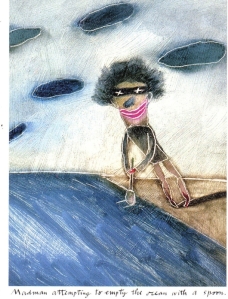 Drawing #1 one is a portrait I’ve lived by since 1996 when Richard Stine’s book was purchased for me. To me, this “mad man” is any man or woman who is involved with educational work. Every teacher must push each student to the next level of his/her intellectual capabilit(ies) and at times, the work parallels Sisyphus and/or the unraveling of a Gordian knot (Yancey, 2008). Given the diversity of every classroom, not to mention the personalities that come with adolescents, I know that working towards 100% success is difficult work. It is, indeed, like emptying an ocean with a spoon, yet it is the work we must do.
Drawing #1 one is a portrait I’ve lived by since 1996 when Richard Stine’s book was purchased for me. To me, this “mad man” is any man or woman who is involved with educational work. Every teacher must push each student to the next level of his/her intellectual capabilit(ies) and at times, the work parallels Sisyphus and/or the unraveling of a Gordian knot (Yancey, 2008). Given the diversity of every classroom, not to mention the personalities that come with adolescents, I know that working towards 100% success is difficult work. It is, indeed, like emptying an ocean with a spoon, yet it is the work we must do.
Leadership and scholarship are no different, except for the fact that the spoon given to us may be shaped different. I often tease that I’m currently trying to empty the ocean wit a fork. Even so, the importance of training tomorrow’s teachers is extremely important and providing them tools to be action researchers and writers, themselves, is needed (Fecho, 2005). The ocean will never be emptied, and it is my philosophy to promote new ways of using such utensils to, at least, look like the impossible can be accomplished. With this said, it is also important to recognize that the process for such work is maddening and if one doesn’t have a sense of humor about it, they will not make it as far as they might if they could laugh.
Mind, Heart & Soul.
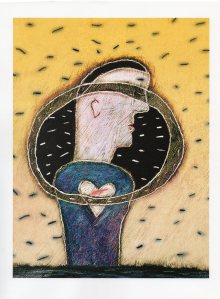 Richard Stine’s second drawing is a roadway that travels, full circle, from the brain, out the eyes, into the chest and heart, out of the body, and back into the brain again. I think that teaching and scholarship requires recognition of this elliptical roadway in every decision that is made and from all the relationships adults have with teachers and their students. Even with the pressure of NCLB on instruction (Hillocks, 2001; McCarthey, 2008; Shosh & Rappe-Zales 2005), the mind, the heart and the soul (Pritchard & Honeycutt, 2006) should not be forgotten. Instead, it must be remembered that there is NO learning outside a relationship and, as Deborah Meier’s writes in The Power of Their Ideas; Lesson for America From a Small School in Harlem (2002), good schools, like good societies and good families, celebrate and cherish diversity.
Richard Stine’s second drawing is a roadway that travels, full circle, from the brain, out the eyes, into the chest and heart, out of the body, and back into the brain again. I think that teaching and scholarship requires recognition of this elliptical roadway in every decision that is made and from all the relationships adults have with teachers and their students. Even with the pressure of NCLB on instruction (Hillocks, 2001; McCarthey, 2008; Shosh & Rappe-Zales 2005), the mind, the heart and the soul (Pritchard & Honeycutt, 2006) should not be forgotten. Instead, it must be remembered that there is NO learning outside a relationship and, as Deborah Meier’s writes in The Power of Their Ideas; Lesson for America From a Small School in Harlem (2002), good schools, like good societies and good families, celebrate and cherish diversity.
The importance of thinking and questioning
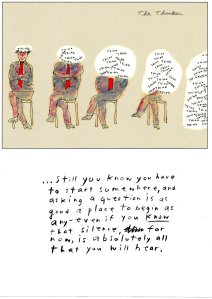 Perhaps my philosophy goes back to the sophists of Plato and Aristotle and does not bring in modern-day experts as much as it should, but I truly believe in the art of questioning in order to bring about the practice of thinking. Trained to the Critical Friends Group approach to my profession (Bambino, 2002; Dunne, Nave & Lewis, 2000), schooled with the Foxfire method for letting students frame their own learning (Wigginton, 1979), branded by the incredible development of the National Writing Project (e.g., Whitney, 2008), and indoctrinated with the Coalition of School’s art of essential questioning (Cushman, 1989), I feel it is always important to put heavy issues before others in order to problem solve where the work needs to go next. In other words, I know myself enough to know that in my scholarship and teaching, I will always look to others to help me find the best answers. I also know that in most answers, there exists grounds for further interrogation. My practice has never been a dictatorship nor a corporate model of networking because such a hierarchal scaffold is not the democratic way my mind operates. Instead, I problem solve with many parties to determine what works best for the majority, always keeping the interests of the majority in mind first, while promoting minority views to be heard, too. I kidded recently to a group of Graduate Students that I have an M.A.T. in English and a B.A. in Literature. I spent summers doing extra work towards an M.A. at the Bread Loaf School of English. I am working towards a Ph.D and although I have an M.S. from the Kentucky Institute for Education and Sustainable Development, my education has been mostly an ART. The only science of my academic background has been with my environmental work. This has led me towards a doctorate in Philosophy. So, I tend to think more philosophically and artistically than I do as a statistician, an actuary, or a chemist. It is what I’ve been trained to do. Teaching and research, then, is about mind, heart and soul.
Perhaps my philosophy goes back to the sophists of Plato and Aristotle and does not bring in modern-day experts as much as it should, but I truly believe in the art of questioning in order to bring about the practice of thinking. Trained to the Critical Friends Group approach to my profession (Bambino, 2002; Dunne, Nave & Lewis, 2000), schooled with the Foxfire method for letting students frame their own learning (Wigginton, 1979), branded by the incredible development of the National Writing Project (e.g., Whitney, 2008), and indoctrinated with the Coalition of School’s art of essential questioning (Cushman, 1989), I feel it is always important to put heavy issues before others in order to problem solve where the work needs to go next. In other words, I know myself enough to know that in my scholarship and teaching, I will always look to others to help me find the best answers. I also know that in most answers, there exists grounds for further interrogation. My practice has never been a dictatorship nor a corporate model of networking because such a hierarchal scaffold is not the democratic way my mind operates. Instead, I problem solve with many parties to determine what works best for the majority, always keeping the interests of the majority in mind first, while promoting minority views to be heard, too. I kidded recently to a group of Graduate Students that I have an M.A.T. in English and a B.A. in Literature. I spent summers doing extra work towards an M.A. at the Bread Loaf School of English. I am working towards a Ph.D and although I have an M.S. from the Kentucky Institute for Education and Sustainable Development, my education has been mostly an ART. The only science of my academic background has been with my environmental work. This has led me towards a doctorate in Philosophy. So, I tend to think more philosophically and artistically than I do as a statistician, an actuary, or a chemist. It is what I’ve been trained to do. Teaching and research, then, is about mind, heart and soul.
Reaching for the Stars
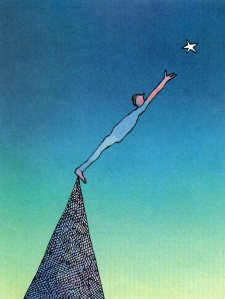 I am not a proponent of apathy, deficit thinking (Cooper, 2006), or low standards and, instead, I believe in many of the traditional items of core curriculum and history. As a result of this, I won’t call myself an enemy of No Child Left Behind because I think the policy raises the bar for all individuals in education. I am also not an opponent of the classical lists often stated as MUSTS in educational settings (although I wish I could be). Instead, I believe in the words of my colleague in Louisville, Kentucky, who said, “Contrary, Bryan. You and I need to teach everything. We have one life to live and we can’t waste our opportunity not to read and be curious about it all.” (Thanks, Alice.)
I am not a proponent of apathy, deficit thinking (Cooper, 2006), or low standards and, instead, I believe in many of the traditional items of core curriculum and history. As a result of this, I won’t call myself an enemy of No Child Left Behind because I think the policy raises the bar for all individuals in education. I am also not an opponent of the classical lists often stated as MUSTS in educational settings (although I wish I could be). Instead, I believe in the words of my colleague in Louisville, Kentucky, who said, “Contrary, Bryan. You and I need to teach everything. We have one life to live and we can’t waste our opportunity not to read and be curious about it all.” (Thanks, Alice.)
The star, however, is not always attainable to all those who are trying to reach it (e.g., Fernsten, 2005) and scholars need to be practical with how much weight is placed on perfection (1% of the billions on Earth have accessibility to a college degree. 99% of the globe does not think in scholarly ways). There is no perfection and we are failing ourselves if we believe otherwise. Like the mad man emptying the ocean, reaching the stars can be very harmful to thinkers who grow comfortable with ivory towers and the moats that protect them (e.g., Fecho, Allen, Mazaros, & Inyega, 2006). As Gloria Ladson-Billing (2006) writes, “an approach to scholarship that integrates lived experience with racial realism” (vii) is needed.
In the process of reaching for the stars, many people are hurt and I think it is important to remember this. I also think it is our job, a Scholarship in Action of sorts, to work within marginalized communities as much as possible and to promote anyone who has a dream of reaching that star.
If this particular Richard Stine drawing was more accurate, I’d like to see a network of individuals holding the man who is reaching for the star with much support, many ropes and collaborated assistance, demonstrating that reaching the star is difficult, but attainable when a community thinks deliberately about how to promote the well-beings of all.
Man Struggling With an Inability to Properly Express Himself In Words
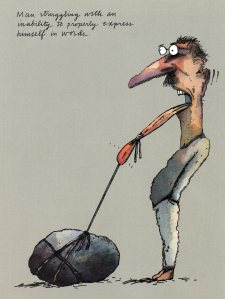 I will always be a writer, first, and a teacher, artist, leader, coach, mentor, etc, second. I’m possessed by language and have always found comfort in writing, expressing myself and putting thoughts to paper. Even so, I don’t necessarily share my writing with others, but I’m getting better at this. I feel safe when I hide behind written words and absolutely fear having to speak them out loud. I recognize writing is difficult for many people, and expressing oneself doesn’t come easy, but playing the keyboard piano has always been something I can do. Vocalizing, however, is a source of immense anxiety and I’m working on this.
I will always be a writer, first, and a teacher, artist, leader, coach, mentor, etc, second. I’m possessed by language and have always found comfort in writing, expressing myself and putting thoughts to paper. Even so, I don’t necessarily share my writing with others, but I’m getting better at this. I feel safe when I hide behind written words and absolutely fear having to speak them out loud. I recognize writing is difficult for many people, and expressing oneself doesn’t come easy, but playing the keyboard piano has always been something I can do. Vocalizing, however, is a source of immense anxiety and I’m working on this.
In school situations, there are many times when we can’t find the words to express ourselves. My idea of academic leadership is to have an open door policy where those who feel they can’t express themselves in my classes are allowed alternative modes of expression. I like to have everyone who knows me feel comfortable enough to share ideas with me and to know I recognize their thoughts matter, too. I wouldn’t want colleagues and staff to feel tongue-tied when discussing big changes in their intellectual thinking and I’d hope to be an advocate for offering creative outlets for them. Graeme Sullivan of Teachers College, Coumbia University, told me that he often has his Graduate students do sculptures to represent their thinking before they begin writing. He recognizes that because individuals are unique, they should be coached to express themselves in multiple ways. I concur (Sullivan, 2006). The trick is in allowing free, democratic and supported expression.
What do You Think?
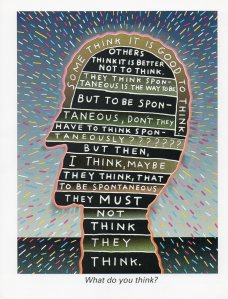 From my work with seven disabled men in southern Indiana, to my work with over six hundred high school students, throughout my days of instructing Sudanese refugees, beyond the years of working with new teachers, and in recognition of all my personal education, I know that EVERYONE has thoughts. In fact, I debated a student who once wrote in a personal essay how she never “thinks” about anything. I challenged her and said, “This is impossible! Everyone has thoughts.” She said she didn’t. After two years in my English classroom, however, she hatched from this stubborn cocoon of thoughtlessness and entered a world of ideas – a metamorphosis I promote and love.
From my work with seven disabled men in southern Indiana, to my work with over six hundred high school students, throughout my days of instructing Sudanese refugees, beyond the years of working with new teachers, and in recognition of all my personal education, I know that EVERYONE has thoughts. In fact, I debated a student who once wrote in a personal essay how she never “thinks” about anything. I challenged her and said, “This is impossible! Everyone has thoughts.” She said she didn’t. After two years in my English classroom, however, she hatched from this stubborn cocoon of thoughtlessness and entered a world of ideas – a metamorphosis I promote and love.
There is a line in a Harry Potter film when Dumbledore, headmaster of Hogwarts, says “Soon we all must face the choice of what is right…and what is easy.” I recognize that in scholarship, there are times when a thinker must act on what they feel is right, and with this arrives the consequences of their decision. Either way, I hope that every action I make in my future, like those made from my past, will be based on careful thought and reflection. I hope that my years in graduate programs have fostered a set of intelligent thoughts necessary to be an effective scholar.
A Romantic Enters the World
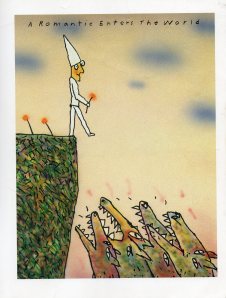 The last Richard Stine cartoon balances my personal, optimistic philosophy of scholarship with the reality of scholarship revealed to me through my studies. It is where a romantic enters a pit of wild dogs. I remember an advisor once saying to me, “Bryan, I hope you maintain your optimism when you enter the teaching profession and I hope the bureaucracy doesn’t eat you alive.” I like to pretend it hasn’t, but I have a few scars that prove I’m learning. Still, I try to sustain a positive outlook for the future of American education and adhere to the poetic words of Brendan Kennelly, “I love/to believe/in hope.”
The last Richard Stine cartoon balances my personal, optimistic philosophy of scholarship with the reality of scholarship revealed to me through my studies. It is where a romantic enters a pit of wild dogs. I remember an advisor once saying to me, “Bryan, I hope you maintain your optimism when you enter the teaching profession and I hope the bureaucracy doesn’t eat you alive.” I like to pretend it hasn’t, but I have a few scars that prove I’m learning. Still, I try to sustain a positive outlook for the future of American education and adhere to the poetic words of Brendan Kennelly, “I love/to believe/in hope.”
I imagine, like with many professional roles, the reality of a higher education will be more biting than the dreaming that goes into its preparation. I prefer a realistic approach to scholarship, myself, but also applaud anyone who is putting forth a creative vision for a better world that pushes our societies to be more effective. I am proud of being an outside-of-the-box thinker and grow sad that educational outliers aren’t the norm. There is nothing wrong with dreaming and if it weren’t for dreams, we have to settle for the mundane. Because I’ve experienced a wonderful k – 12 public school and because I’ve had a charmed, irreplaceable journey thus far, I cherish the unique, hopeful mission of the work I do. I’ve seen what vision accomplishes for the world and how wonderful educational facilities can be. My goal is to bring this optimism elsewhere and to offer it to those who may or may not have had such luck.
Today’s secondary educators are responsible for teaching academic writing in preparation for college (Simmons, 2005; Spellings, 2006), for personal expression (Fernston, 2005), for writing to learn (Shanahan, 2004), for creative work (Burke, 1999), and for work-place writing (National Commission for Writing, 2004, 2005). High school teachers, as well, are to encourage writing as a way for developing personal identity and agency (e.g.. Au, 2000; Mahiri & Godley, 1998; McCarthey & Moje, 2002; Morrell, E. & Duncan-Andrade, 2002; Morrell, 2005; Moje, et. al, 2004; Moje, 2000; 2007; New London Group, 1996; Obidah, 1998). High School teachers, however, are still not spending enough classroom time devoted to authentic writing instruction (Hillocks, 2002; Scherff & Piazza, 2005; Simmons, 2005) and most writing assignments still ignore how to write for audiences beyond a teacher assigning a grade (Pritchard & Honeycutt, 2005; Ong, 1975). Despite utilizing the writing process promoted through writing research (e.g., Applebee, 1984; Elbow, 1981; Emig, 1971; Murray, 1980), writing instruction in secondary schools continues to be product based for state assessments (Hillocks, 2002, 2006; Pritchard & Honeycutt, 2005; McCarthey, 2008; Scherff & Piazza, 2005). Without intent instruction to foster audience awareness in high school writers, teachers fail to teach critical aspects of the writing process (Lewis, 2001) and to prepare students for tomorrow’s writing needs (The Commission on Writing, 2003, 2004, 2005, 2006; Simmons, 2005; Spellings, 2006). Even though writing strategies exist for secondary educators (Graham & Perin, 2007), more writing research needs to be done especially with how high school educators understand their professional leadership in the writing classroom (Allen, Mazaros, & Inyega, 2006; Coker & Lewis, 2008; Pressley, 2007). Students need to write more than ever before and new models for writing, new curriculum to supporting new models, and new frameworks for teaching new curriculum are needed (Yancey, 2009).
In summary, my philosophy is to be less Chicken Little and more Peter Pan. I believe in what John Dewey, Gloria Ladson-Billings, Ted Sizer, Ernest Morrell, Deborah Meier and Eliot Wigginton have written from their experiences. I hope to carry forth such ideas in my own practice. I believe scholarship is exhausting, impossible work, but I know that a good attitude is behind everything that changes the world for the better. Therefore, I know I will choose to be creative and optimistic as I push onward.


